GRANMA. TROMBONES FROM HAVANA
Cuba has repeatedly featured in romantic dreams of a just society. But aside from such idealisation, what is it like to live there in a socialist reality? Four young Cubans report on the Revolution’s past and present through dialogues with their grandparents.
Schauspiel Köln, Depot 1
Language: Spanish with German and English surtitles
Special on 11.06. after the performance:
Post-show talk in Spanish with the performers (with German translation). Chaired by Sebastian Brohn, dramaturg, Ringlokschuppen Ruhr
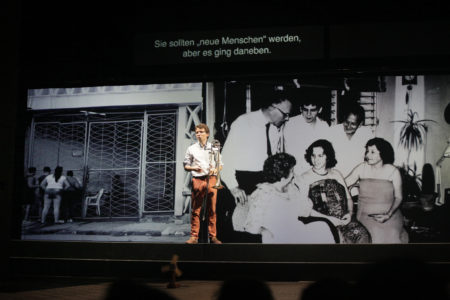
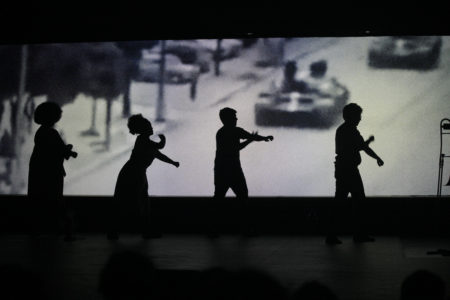
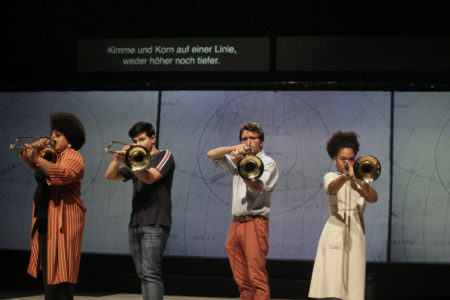
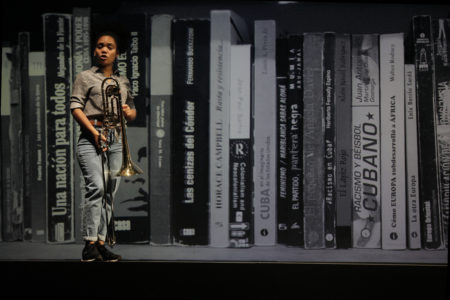
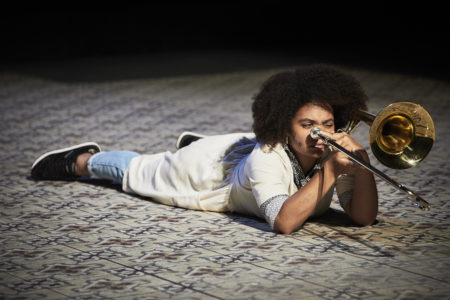
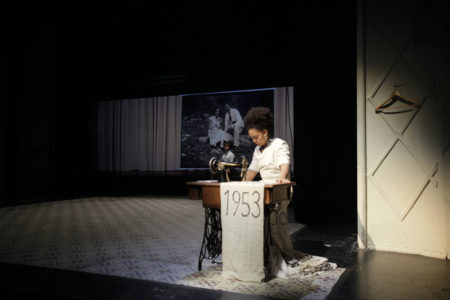
Faustino Pérez landed in Cuba with Fidel Castro on the motor yacht ‘Granma’ and became the first Minister for Distribution after the revolution. His grandson Daniel still owns the catalogue from an auction in which confiscated tiaras and beach houses were sold off. Beside him stands the 24-year-old computer programmer Christian, whose grandfather went to fight in the civil war in Angola. History student Milagro tries to understand why the revolution that enabled her to study will barely be able to feed her if she becomes a Professor. 31-year-old Diana was able to study music but her grandfather was not because he was poor and black. Nevertheless he was able to perform for the troops of fellow socialist countries around the world with the Orquesta Maravillas de Florida.
In GRANMA. TROMBONES FROM HAVANA these young Cubans travel in time through several generations. They offer us glimpses of their photo archives, let us hear their grandparents in videos and interweave their family histories with social and political questions from a present in which Cuba is changing: does the young generation want to modernise the country? To conform? To emigrate? Or to continue the revolution? The answer remains open. However, on stage these four young people practice revolutionary action: together they learn something they had never previously thought possible —
playing the trombone.
Credits
With: Milagro Álvarez Leliebre, Daniel Cruces-Pérez, Christian Paneque Moreda, Diana Sainz Mena
Concept, Director: Stefan Kaegi
Stage Design: Aljoscha Begrich
Video: Mikko Gaestel
Music: Ari Benjamin Meyers
Sound Design: Tito Toblerone, Aaron Ghantus
Dramaturgy: Aljoscha Begrich, Yohayna Hernández
Costumes: Julia Casabona
Technical Direction, Light Design: Sven Nichterlein
Production Management: Maitén Arns
Video Associate: Marta María Borrás
Dramaturgy Associate: Ricardo Sarmiento
Assistant Director: Noemi Berkowitz
Assistant Stage Design: Julia Casabona
Production Assistants: Federico Schwindt, Dianelis Diéguez
Interns: Joana Falkenberg (Stage Design), Ignacia González (Direction), Lenna Stam (Costumes)
Tourmanagement: Maitén Arns, Federico Schwindt (on tour)
Contact for touring enquiries: Maitén Arns, arns[a]rimini-protokoll.de
Production
A production by Rimini Apparat and Maxim Gorki Theater Berlin in co-production with Emilia Romagna Teatro Fondazione, Festival TransAmériques (Montréal), Kaserne Basel, Onassis Cultural Centre — Athens, Théatre Vidy-Lausanne, LuganoInscena-Lac, Zürcher Theater Spektakel, Festival d’Avignon. Funded by Kulturstiftung des Bundes, Pro Helvetia, Senatsverwaltung für Kultur und Europa. In co-operation with Goethe-Institut Havanna.
Biography
Stefan Kaegi studied Philosophy in Basel, Art in Zürich and Applied Theatre Studies in Gießen. He directs documentary theatre plays, urban environmental works and audio plays in a range of configurations that are usually produced under the label he founded together with Helgard Haug and Daniel Wetzel in 2000 Rimini Protokoll. Rimini Protokoll often devise their stage plays, interventions, scenic installations and audio dramas together with experts who have proved their knowledge and abilities outside the theatre. Rimini Protokoll have received numerous awards including the German Theatre Prize Faust, the European Theatre Prize and the Silver Lion at the Venice Theatre Biennale.

